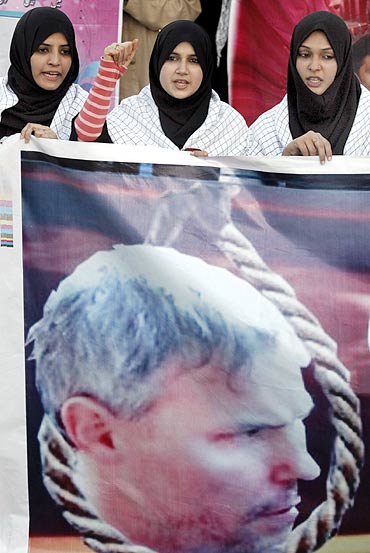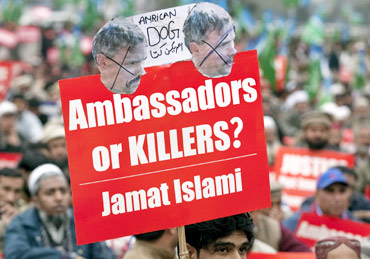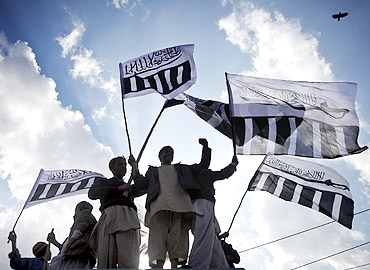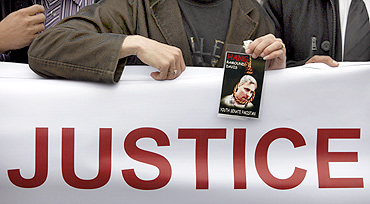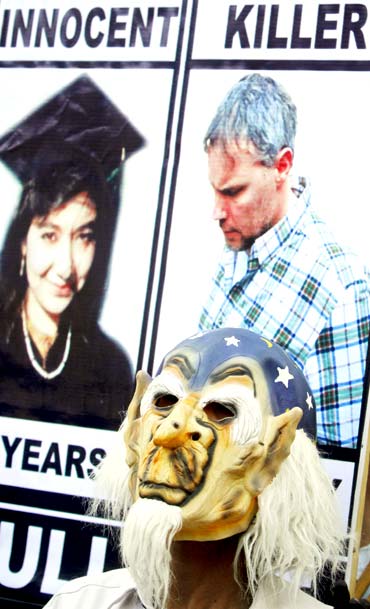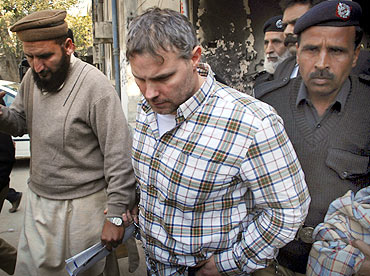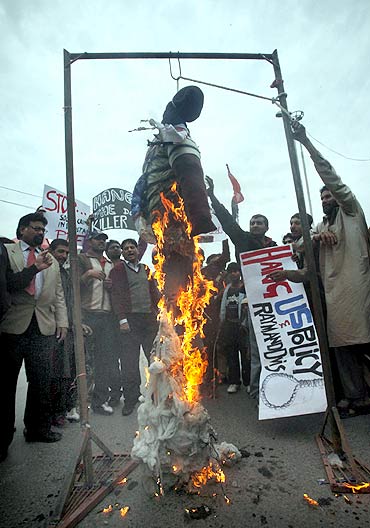 | « Back to article | Print this article |
Davis case: Will angry America cut aid to Pak?
The Raymond Davis incident had been handled very badly by both sides, but more so by Washington, south Asia experts tell rediff.com's Aziz Haniffa
Even as the Barack Obama administration called on Pakistan to release American citizen Raymond Davis, saying he has diplomatic immunity, south Asia experts plugged in with the hierarchy of the Pakistan army and its Inter Services Intelligence said Washington and Islamabad must resolve the saga soon.
Else, the experts warned, it could affect the flow of billions of dollars of economic and military aid to Pakistan -- which Congress is to deliberate later in March -- and complicate the United States-led war on terror in Afghanistan.
Davis -- suspected to be linked to the Central Intelligence Agency -- was arrested for killing two Pakistanis -- who he alleged were trying to rob him -- in Lahore. After a Lahore court rejected his claim for diplomatic immunity, State Department spokesman Phillip J Crowley called on Davis to be immediately released under the Vienna Convention, since he has diplomatic immunity.
The court said that in the absence of a certification by the government of Pakistan that Davis had diplomatic immunity, it would presume he did not have any such immunity and hence could not be released. Crowley continued to reiterate that Washington had informed Islamabad on Davis's arrival in Pakistan in January 2010 that he was attached to the US embassy's administrative and technical staff. "That was notification that he, in fact, has diplomatic immunity," Crowley said.
'It's going to affect the war in Afghanistan'
Shuja Nawaz, director, South Asia Programme, Atlantic Council, and Stephen P Cohen, who heads the South Asia studies department at the Brookings Institution, said the saga damaged the CIA-ISI cooperation and complicated the broader US-Pakistan relationship.
With Congress now getting into the act, the experts warned that it could jeopardise the $3.5 billion aid package coming up for deliberation in the House of Representatives later in March.
Nawaz, author of the seminal book Cross Swords: Pakistan, Its Army, and the Wars Within, said, "There has always been a certain level of trust and mistrust among the intelligence agencies -- the CIA and the ISI."
Nawaz said he did not believe the Davis controversy had done "irreparable damage." But, he warned, "The longer this issue remains unresolved, it's going to create political difficulties, economic difficulties, and the result is that it's going to affect the war in Afghanistan. So, it's imperative that both sides get their heads together and resolve this in whatever manner they can. One is, resolve the status of Davis, and the other is the criminal charges against him. They have to be treated separately; then both sides can move forward."
'Pakistan envoy being scolded by senior US officials'
The US-Pakistan Strategic Dialogue was canceled in February following the controversy, although the official reason cited by the State Department was that the cabinet reshuffle in Pakistan had led to the talks being postponed.
Pakistan Ambassador Husain Haqqani, who would cruise in and out of the State Department and the National Security Council at the White House, was now only being summoned to be scolded by senior US officials and threatened with all manner of consequences if Davis wasn't released expeditiously.
Nawaz acknowledged that with the current anathema towards foreign aid, the Davis incident and Pakistan's refusal to release him could offer up a perfect excuse for the lawmakers to make massive cuts to the $3.5 billion aid package.
Particularly so, he added, because the Republican-controlled House, looking for any excuse to reduce the massive US deficit, would be looking at all opportunities for cuts.
This in turn, Nawaz said, would complicate American efforts, led by the likes of Senators John F Kerry, chairman, Foreign Relations Committee, and his Republican colleague, Richard Lugar, the ranking minority member on the panel, to reach the hearts and minds of people in Pakistan, where anti-Americanism is at its height, compounded by US drone attacks.
'Davis is being held under very questionable circumstances'
When Clinton appeared before the House Foreign Affairs Committee to testify on the State Department's foreign-aid budget, Committee Chair, Republican Ileana Ros-Lehtinen, said, "Pakistan must do more to meet the pressing United States concerns, including the release of Davis... and shifting its approach to Afghanistan away from armed proxies and toward constructive and legitimate political partners."
Another ranking Republican on the Committee, Congressman Dana Rohrabacher, thundered, "We borrow from China; give to Pakistan; Pakistan creates nuclear weapons. Pakistan has received billions of dollars worth of aid; yet they have a US citizen, Davis, who is now being held and is under very questionable circumstances. Are we going to still give our money away to people who support the Taliban and put our intelligence assets at risk?"
Nawaz said the Davis incident had been handled very badly by both sides, but more so by Washington, which had put Pakistan President Asif Ali Zardari's government between a rock and a hard place. The massive US pressure was resented by the common Pakistani, and if Davis were released now without going through the judicial process, the Zardari government would become even more unpopular than it already was.
'Obama must have been briefed about Davis'
"The US put out its statement (that Davis should be released because he has diplomatic immunity) a little too early before it had prepared the groundwork for some resolution of this issue," Nawaz said.
He pointed out that two days after President Obama's diplomatic-immunity remarks, it became known that Davis was a CIA contractor.
"Clearly," Nawaz continued, "he (Obama) must have been briefed (that Davis was a CIA operative)." Hence, Nawaz added, Obama's statement put the US government in an awkward position and compounded the problems for the Zardari government.
Nawaz dismissed some of the so-called claims reported to have been made by then Pakistan foreign minister Mahmoud Qureshi, alleging that Qureshi had been asked to backdate the diplomatic immunity for Davis and his refusal had cost him the foreign minister portfolio.
'What Americans were doing is a deep insult'
"I haven't heard anything on that except what he's been saying. But, if in fact that was the case, he could have issued a statement in the first 24 hours and resigned," Nawaz said.
Cohen said the US-Pakistan relationship -- evidently on hold right now -- was "salvageable."
"Had this been settled quietly by both intelligence services early on, we would have been much better off, because on one hand, what the Americans were doing in Pakistan is a deep insult to Pakistani pride and integrity at a moment when their pride and integrity is being weakened," he said.
Cohen continued, "We don't know what he (Davis) was doing. He might have been doing things in cooperation with the Pakistani government. The Pakistanis themselves were not quite sure what he was doing; but they have lost control of their own country. There are deep suspicions that he (Davis) was doing more than simply observing -- he was trying to manipulate Pakistani politics. It (the situation) is salvageable, but it's going to require the kind of leadership and attention to Pakistan -- not simply by the intelligence services but by the policy people here -- which has not been forthcoming in the past."
'Pakistan continues to deteriorate'
He described the US-Pakistan relationship as "pathological."
"We demand and expect far more from them than they could ever deliver. On their side, they played us both ways against the middle. So, it's been an unhealthy relationship, and while this is going on, Pakistan continues to deteriorate as a country," Cohen pointed out.
The Davis case may finally be taken to the International Court of Justice, "which would provide everybody with a way out," he continued. "But the bottom line is can Pakistan afford to break with the US completely? On the other hand, can we afford to see Pakistan drift in the direction it's drifting? Stopping that drift may not be possible. Clearly this (the Davis saga) is no help to them."
Both Nawaz and Cohen were sympathetic towards the situation Haqqani finds himself in, vis-a-vis fielding the brunt of US diplomatic wrath.
'Anti-American sentiment at dangerously high levels'
"Haqqani is obviously a target because he's visible," Nawaz said. "But whatever he does is what the government of Pakistan asks him to do." Cohen felt, "Husain likes challenges -- I know that. There's no question he's earning his salary."
Lisa Curtis, a former CIA analyst and current head of the South Asia division at the conservative Heritage Foundation -- another Washington, DC think tank -- was recently in Pakistan to attend the US-Pakistan Forum.
"The Pakistan media frenzy over the Davis case has driven anti-American sentiment to dangerously high levels," Curtis warned.
"Further complicating the case is the high level of tension between the countries' intelligence services. Several media reports indicate Davis may have been involved in a clandestine operational act and that the two Pakistanis killed may have been ISI (cadre)," she said.
